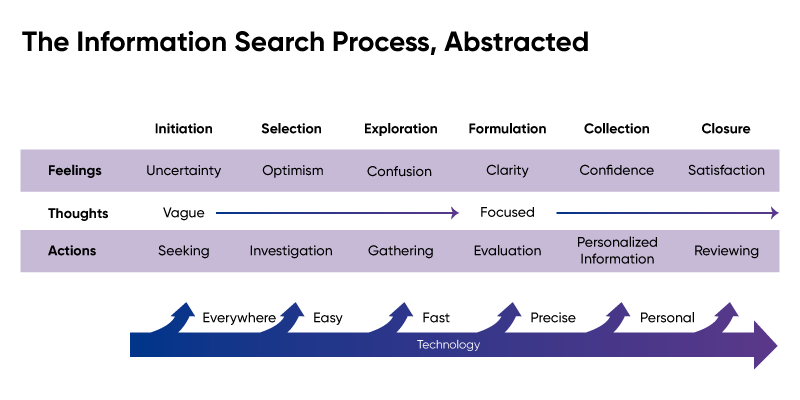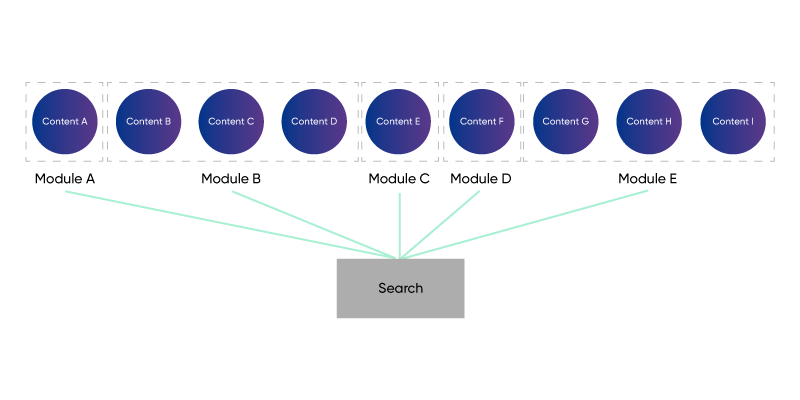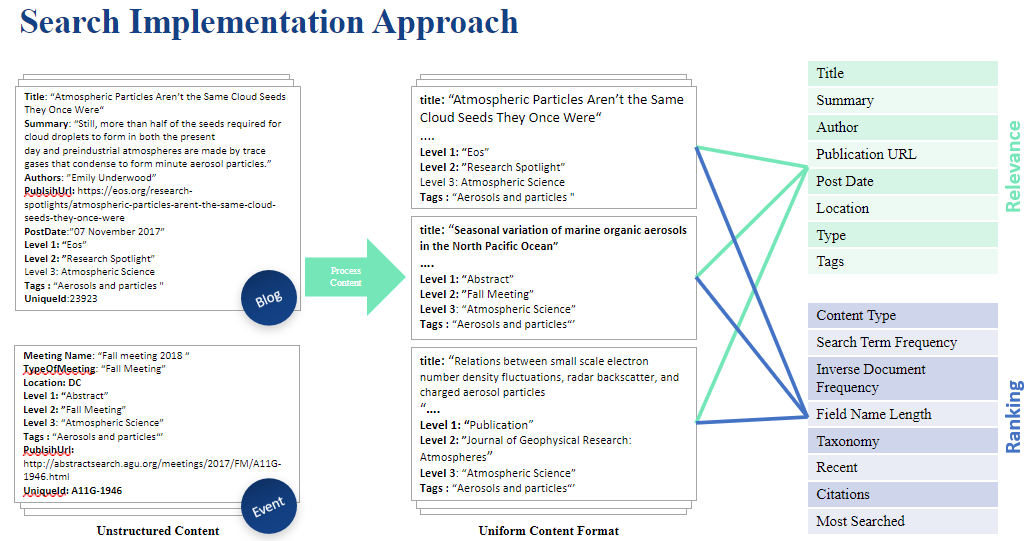
Subscribe
Be the first to know about our latest posts.
-
Service
ecommerce solutions -
Sub-Service
composable commerce, Sitecore, website development
Explore Icreon’s Ecommerce Solutions
Streamlining Search in Composable Architecture: Practical Solutions Explained
Imagine a sprawling city built without a map. This is the search landscape in many composable architectures – a vast network of independent components where finding the information you need can feel like a challenging task.
Composable architecture is revolutionizing how we build IT systems, offering a modular and flexible approach. Unlike monolithic systems – the old, one-size-fits-all approach – composable systems are built from independent, reusable components. This brings incredible agility and customization, but it also introduces a unique challenge: search.
In this blog, we’ll walk you through complexities of search in composable architectures and equip you with effective strategies to overcome them.
Decoding Search Challenges in A Composable Architecture
Composable architecture is always powerful, flexible, but somehow lacks a streamlined search. From fragmented data to decentralized storage - discover the hurdles to effective information retrieval in composable architectures below.
Distributed Data:
Composable architecture often involves distributed data storage across various modules or applications. This distributed nature poses challenges in maintaining a unified and efficient search index. Coordinating and synchronizing indices across disparate components requires sophisticated mechanisms to ensure real-time search accuracy.
Interoperability and Data Formats:
With modular components potentially employing different data formats and structures, ensuring seamless interoperability becomes a significant hurdle. Effective search requires a standardized approach to data representation, and reconciling diverse formats across a composable architecture demands careful consideration.
At Icreon, we have a team of Sitecore MVPs who are adept at navigating the complex terrain of data while meeting the needs of real-time data insights and facilitating instant access to information. For instance, AGU, a non-profit organization, was challenged to provide their users direct access to relevant information and recognized the need to revamp their existing portal into a dynamic digital platform.
This transformation aimed to offer users a personalized experience within a vast repository of data and content spanning a century, serving a diverse membership exceeding 62,000 individuals while meeting the demand for real-time insights.
Together, AGU and Icreon embarked on an ambitious mission to ensure that the right information reached the right people at the right time, thereby fulfilling the increasingly complex needs of the AGU community.
In this transformative endeavour, Icreon team helped AGU achieving a staggering 287% increase in donations and a 40% rise in the average donation through a cutting-edge digital transformation.
Dynamic Resource Allocation:
Composable architecture thrives on dynamic resource allocation, adapting to changing workloads and priorities. However, this dynamism complicates search functionalities, as the availability and location of relevant data may shift continuously.
Designing search algorithms capable of efficiently adapting to these fluctuations is crucial for maintaining optimal performance. Regularly checking and improving the relevance and ranking of search results is important:
- Relevance: Relevance is how well a search result matches what the user is looking for. It shows how closely it fits their needs.
- Ranking: Ranking is when search results are ordered or prioritized based on their relevance to the user's query.
Real-time Search Requirements:
Many applications demand real-time search capabilities, a challenge exacerbated by the distributed and modular nature of composable architecture. Coordinating real-time indexing and retrieval across diverse components necessitates advanced algorithms and infrastructural support.
For example: Customer information stored in a CRM system, transaction data in an e-commerce module, and support tickets in a helpdesk application. Searching for a complete customer profile in real-time requires aggregating information from these disparate sources.
EBOOK | MOVING FROM MONOLITH TO COMPOSABLE CMS
Planning to commence digital transformation journey with composable CMS? Get your hands on a powerful migration strategy, steps to transition, and best practices to overcome the challenges.
Inconsistent Tagging (meta data issues):
Many organizations jumpstart their metadata management by acquiring a dedicated tool (or suite of tools). While these tools offer undeniable benefits, their implementation often presents challenges. The issue lies in operating in isolation: tools often fail to connect their outputs with specific business needs, pain points, or deliverables. This disconnect leads to inconsistent tags, which can produce misleading search results. Furthermore, extensive tagging practices can easily become counter-productive, overwhelming users and hindering efficient information retrieval.
Mitigating Search Challenges
Now that we know the search problems of a composable architecture, let's look at different ways to solve them easily.
- Unified Search APIs: Developing unified search APIs that abstract the complexities of underlying components can streamline search functionality. This approach allows for a consistent and standardized interface, irrespective of the diverse nature of composable architecture components.
- Advanced Indexing and Caching Mechanisms: Implementing advanced indexing and caching mechanisms can significantly enhance search performance. By intelligently pre-fetching and caching relevant data, organizations can mitigate the impact of distributed architecture on search speed.
- Track Intent: User intent changes regularly, capturing key metrics that impact search allows businesses to understand what customers are looking for and can provide unique opportunities for delighting customers in their search journey.
- Machine Learning for Adaptive Search: Leveraging machine learning algorithms can enable adaptive search functionalities that learn and optimize based on usage patterns, ensuring efficient search operations even in dynamically changing environments.
- Guard against Silos: In the world of composable, every new tool/technology added to the existing tech landscape can easily become a silo if it doesn’t work well with the overall ecosystem. Be careful of one-off or siloed projects, and always tie content/data back to specific business use cases and outcomes.
The Future of Search in Composable Architecture
By strategically combining innovative technologies, standardized interfaces, and adaptable algorithms, organizations can unlock the full potential of this flexible IT paradigm.
Addressing the search intricacies discussed in this blog – from inconsistent tagging to decentralized data – will be pivotal for navigating the composable landscape. This proactive approach empowers organizations to confidently step into a new era of modular, scalable, and efficient IT infrastructure.
If you are ready to take the next step in improving composable systems for better search experiences, start a conversation with our composable system experts.





